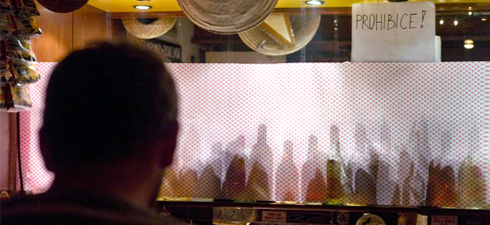This country, despite all the efforts of Brussels euro-bureaucrats and their domestic collaborators, remains an almost solitary island of true freedom in a world that, with its various prohibitions and – sorry for this term – direct regulations, is rushing into slavery.
We can expect therefore that a few Hegers [Leoš Heger — Czech Minister of Health] and similar types will try to exploit the current crisis hitting the market in hard liquor and restrict a fundamental right fought for long ago in all the public squares of the country: totally free access to any kind of booze anywhere and at any time of day or night. I wish they only would.
The partial prohibition, declared by the authorities on Friday night September 14 in a state of absolute despair, cannot go on forever. The end of that prohibition, though, could be the right time to start talking quite seriously about keeping part of it in place, because there are good reasons for it and because it would push the country further up the road to civilisation.
An island of freedom
Undoubtedly, voices will be raised declaring that “prohibition doesn’t solve anything,” and we’re sure to hear of loads of examples from around the world of how efforts to restrict the availability of hard alcohol failed, how they get skirted, how they just encourage the black market... Indeed, there were humorous allusions on Facebook as to whether Miroslav Kalousek [Czech Minister of Finance, who has a reputation for enjoying his drink] was the right one to preach about the dangers of easy access to hard liquor.
Maybe he’s not really the right one, but this time truth is on his side. And although in the debate it will certainly be useful to listen to sceptics presenting their arguments and experiences, in the situation we are in now we should rather look to countries where hard liquor is actually treated as what it is – in essence, a quite dangerous drug, which perhaps differs from illegal drugs only in that the state reaps handsome taxes from its sale.
But in the Czech Republic, this “liberal paradise”, the situation has got slightly out of hand. That’s no accident, but rather the rule of the Czech version of “freedom”. It would seem related to other things particular to the Czech Republic – for example, the number of gaming casinos, unequalled in Europe, where you’re free to throw away your pay and social benefits, or even the bold resistance to “fashionable trends” that would hold us back from enjoying a cigarette after lunch right under the noses of our table companions in a crowded restaurant.
Rather than an island of freedom, however, it brings to mind a rustic open-air museum, where of course anyone can find a little peace; but perhaps it’s time to look around somewhere else. (The author admits that he is neither a non-smoker nor a teetotaler.)
Ordinary alcoholism
First, ban the street stalls. Anyone who wants to go blind or even kill himself with bootleg vodka can eventually pull it off, even if the sale of hard liquor is prohibited flat out. But it could be made a little more difficult for him. After all, with such a gambler there are certain expenses that his contributions to the Ministry of Finance fail to cover.
The same is true for less drastic cases of “ordinary alcoholism”. To ban street booths selling hard liquor could therefore be the first and rather straightforward step. And then we can start to talk about whether the Czech Republic might be a good place to try out the model of countries that certainly don’t consider themselves totalitarian states and where spirits are sold only in specialist licensed shops and between certain hours, which decidedly don’t include half-past three in the morning. Anything is better than the situation we have today.
This assumes, of course, that in addition to this official repression the state will be able to carry out its other functions, which evidently it has neglected in recent years despite all the warning signs, and that it will be able to combat the black market just as successfully as it will small marijuana grow-ops. Because this truly is a problem that has nothing to do with “freedom”.
Was this article useful? If so we are delighted!
It is freely available because we believe that the right to free and independent information is essential for democracy. But this right is not guaranteed forever, and independence comes at a cost. We need your support in order to continue publishing independent, multilingual news for all Europeans.
Discover our subscription offers and their exclusive benefits and become a member of our community now!












